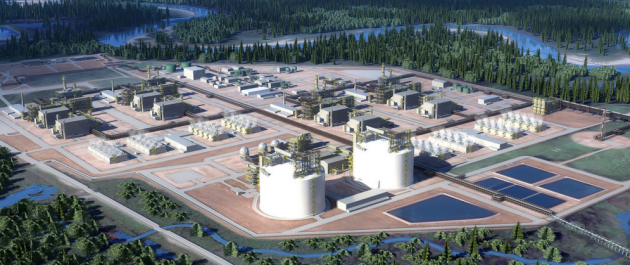
Study refutes B.C. LNG sector’s ability to reduce global emissions
by Ian Bickis, The Canadian Press

The authors of the C.D. Howe study recommend that B.C. focus on reducing emissions in the province rather than hoping LNG brings down emissions abroad

A planned pipeline would link B.C.’s natural gas fields with a proposed LNG export terminal in Kitimat, B.C. PHOTO: LNG Canada
The C.D. Howe Institute released a report Wednesday that concluded that Canada’s LNG exports could reduce carbon emissions in parts of Asia, but would likely increase emissions in the majority of other potential markets.
The development of LNG exports requires power to cool it into a liquid, as well as energy for the tankers that would ship it overseas so that it can be used in gas-fired power plants.
Study authors James Coleman and Sarah Jordaan said LNG exports would still reduce overall emissions if they replace coal and oil-fired power production in China, India, Japan and Taiwan.
But they found that emissions would likely go up in nine of Canada’s 13 likely export markets because those countries have greater supplies of renewable and lower-emission power sources.
Coleman and Jordaan said overall, it is “far from certain” that Canadian LNG exports would reduce global greenhouse gas emissions.
The study comes as B.C.’s hope of a thriving LNG export market are fading, with several projects recently shelved.
The Pacific Northwest LNG project, led by Malaysian energy giant Petronas, remains the biggest and most high-profile project on the table, with an estimated cost of $36 billion. It is awaiting a report due soon from the Canadian Environmental Review Agency.
But the development has faced criticism for both direct environmental impacts on fish habitat, as well as its potential to increase greenhouse gas emissions.
The authors of the C.D. Howe study recommend that B.C. focus on reducing emissions in the province rather than trying to bring down emissions abroad because the final markets for LNG are too difficult to determine.
They said particular attention should be paid to reducing methane leakage during transportation and greenhouse gases vented during the processing of natural gas, and the need for a better understanding of how much gas escapes along the whole supply chain.
The B.C. government has taken some action on methane, committing in its climate plan released last week to reduce methane emissions from oil and gas production by 45 per cent.
The plan also called for increased electrification of natural gas production fields to reduce emissions. But it did not commit funding for the infrastructure, which can be expensive, required to make that happen.